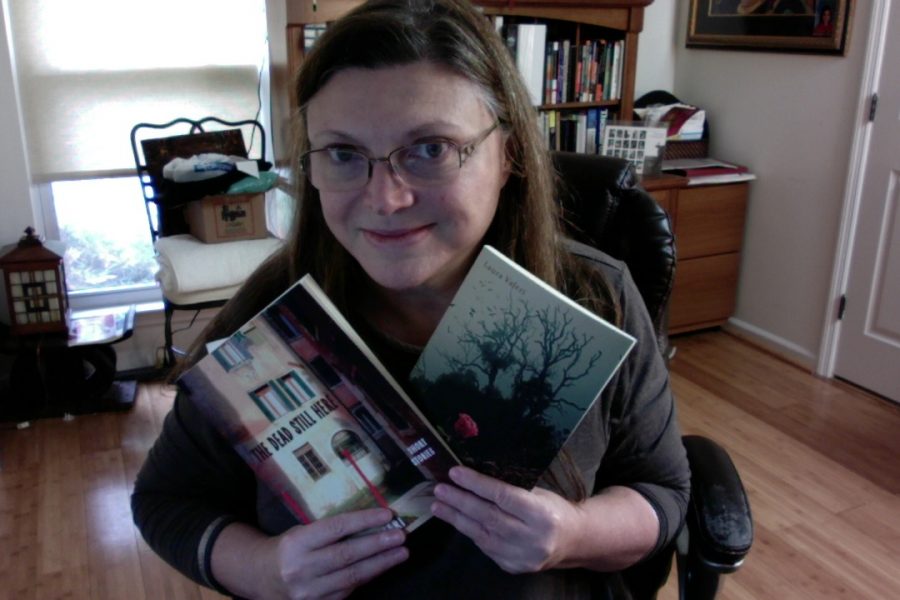Laura Valeri is a professor at Georgia Southern University who teaches writing and specializes in fiction, nonfiction, and screenwriting. She has published short stories, creative nonfiction essays and three books of fiction. She used to work in television and plans to publish another book soon. When asked to give tips to aspiring writers, this is what she had to say:
Take a Class
What you get out of a writing class is more than just what you learn while you’re there. According to Valeri, a writing class is a good opportunity to make connections with people in the writing community who are interested in the same things you are. It can also be your personal think tank. A writing class is full of people who pay attention to storytelling and narrative and can help give you an idea on how to be a better writer. They can even give you ideas on what to write, whether it be by talking to them about ideas or simply listening to them and gaining inspiration. They can also give you valuable feedback on what you’ve written and can help you improve.
Build Community
“A lot of people think that writing is a lonely thing, and sure enough, I mean, you do spend a lot of time alone in a room writing and thinking about things,” Valeri said. “But there’s also an aspect about it that’s very community related, and we start very early forming these communities, and you need them as you grow because you need to have multiple input on ideas, it’s how creativity works.”
Ways Valeri suggests to build community:
- Taking a class
- Joining a club (ex. creative writing club)
- Make your own club
- Go to events (ex. open mics like Burning Swamp)
- Social media (look around for local writing groups or just get in contact with people)
- Online communities (ex. Wattpad, NaNoWriMo, Scribophile, etc.)
Make a Commitment
According to Valeri, the most difficult thing about writing is finding time to do it. To be a writer, you have to chose to sit down and write even if you don’t feel like it. In an ideal world, you should write every day because getting into the habit of it can help your brain naturally think as a writer. Even if it’s for twenty minutes every other day, having any kind of schedule can help you write easier. This can be hard since life always seems to get in the way, but this is an obstacle every writer must face and learn to overcome.
Do’s and Don’t’s
Don’t get too hung up on how-to’s or writing guides. The worst thing you can do is restrict yourself to criteria and hurt your flow and growth as a writer. With that being said, Dr. Valeri gave these do’s and don’t’s:
- DO: Write through all the junk in your head. Even if you think it’s bad, it’s still good to get it out. Then you can go back and revise it.
- DON’T: Don’t be cocky. You will never become a better writer if you refuse to admit you can learn from others. Accept that you need to grow and challenge yourself.
Understand “Show Don’t Tell”
This phrase has been used a lot in Writing and English circles, but it is repeated for a reason. It is a quick statement on the best way to write, but it is a lot more complicated than it appears to be. Dr. Valeri recommends learning screenwriting, especially if you plan on writing fiction. Screenwriting is a medium that focuses mostly on dialogue and stage directions, so it forces the writer to think about how they can create a meaningful story and characters in as few words as possible. Writing in general, especially fiction, has many layers to being believable and effective. Learning about these levels and the different ways you can approach them can help you be a better writer.
Learn From the Things You Read
This depends on what you want to write. It is always best to read and learn from books and stories you like and aspire to write like. Read like a writer and study the way other authors write plot and create worlds. Just get to know your genre and don’t rely too heavily on How To’s. You can also find blogs online for a variety of genres.
If you are unsure of where to start, Dr. Valeri recommends these works to help you get started:
- Immediate Fiction by Jerry Cleaver
- The Wanderer by Vandermeer
- The Poet’s Companion by Kim Addonizio
Shape Your Writing and Let Your Writing Shape You
“I think that knowing how to write creatively makes you a better thinker and a better person, said Valeri. “If you want to be a better person, learn how to write because writing kind of takes you into people’s minds and makes you have to try really hard to understand where they’re coming from and why they’re doing what they’re doing, and that in return, that makes you a better person, makes you more capable of understanding subtleties and nuances and it makes you a more subtle thinker.”







